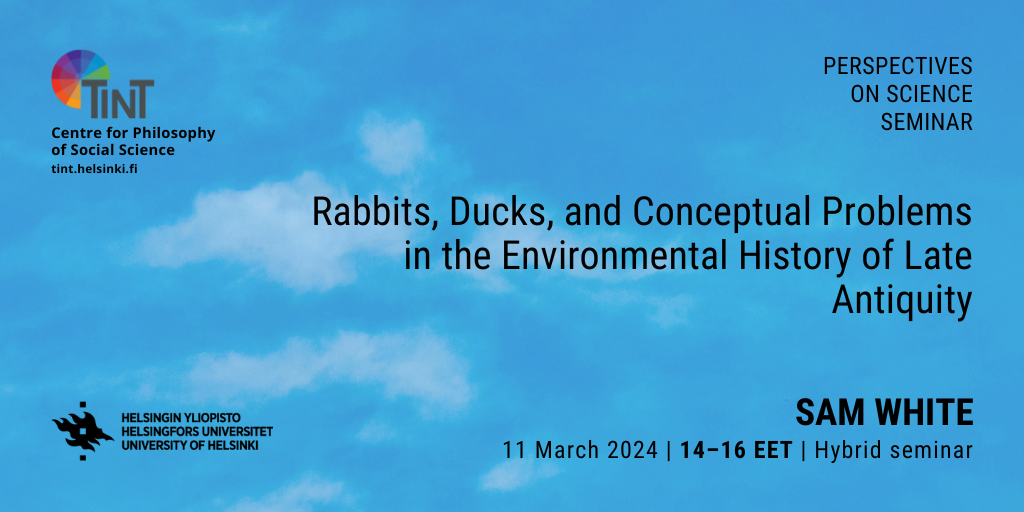
In the next Perspectives on Science seminar, Sam White (University of Helsinki) will give a talk titled “Rabbits, Ducks, and Conceptual Problems in the Environmental History of Late Antiquity.”
The seminar takes place in person at Metsätalo and online via Zoom from 14:15 to 15:45 on Monday the 11th of March 2024. To join the seminar, please contact samuli.reijula@helsinki.fi for the location or Zoom invitation.
Perspectives on Science is a research seminar which brings together experts from the philosophy of science and several fields of science studies. It is organized by TINT – Centre for Philosophy of Social Science at the University of Helsinki. More information about the seminar can be found on the TINT web page https://tint.helsinki.fi.
Abstract
Investigations in the historical sciences often confront persistent (contrastive) under-determination of theory by evidence. In some cases, rival theories may persist indefinitely in a state of uncertainty or indifference. Yet in most cases the hope is that new evidence and methods will bring at least partial and provisional resolution. Unfortunately, there can be cases when new evidence and methods appear to aggravate problems of under-determination rather than resolve them, producing sharply divided and apparently irreconcilable positions on historical questions. One such case is the environmental history of the Late Antique Mediterranean (e.g., early Byzantine Empire): once a quaint and obscure branch of study that has now drawn a disproportionate share of research attention and scholarly polemics. Teams of historians, archaeologists, paleoclimatologists, and geneticists have clashed over “maximalist” and “minimalist” positions regarding environmental disasters, plague mortality, and political collapse in the 3rd-6th centuries CE; and in numerous cases, have attacked each other’s methods, epistemology, and reasoning. Using the familiar rabbit-duck illusion as a metaphor, I argue that debates in the field have been derailed by feedbacks between divergent historical interpretations, on the one hand, and divergent approaches to historical analysis and interdisciplinary consilience, on the other. The paper proposes some modest solutions grounded in Bayesian reasoning. Problems in the environmental history of Late Antiquity analyzed in my paper may also represent wider problems in historical epistemology.
Author bio
Sam White joined the University of Helsinki as professor of political history in October 2022. He teaches on environmental history, historiography, and the uses and politics of history. His research specializes in reconstructing past climates and extreme weather and understanding their roles in human history. His publications include narrative monographs, scientific collaborations, and works on theory and methods. He currently leads the Past Global Changes (PAGES) working group on Climate Reconstruction and Impacts from the Archives of Societies.
